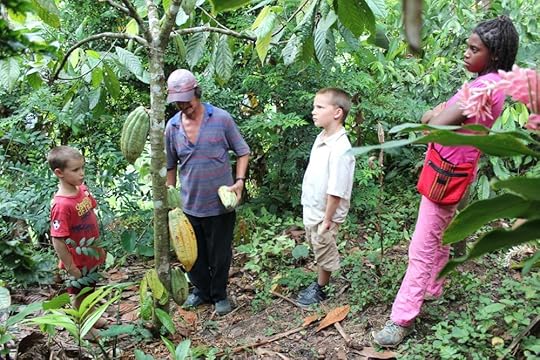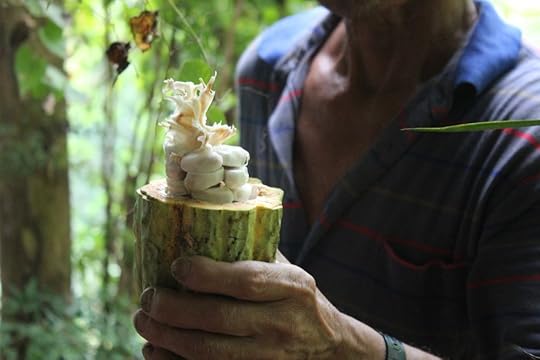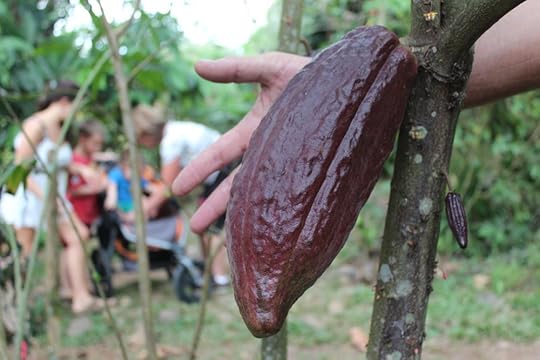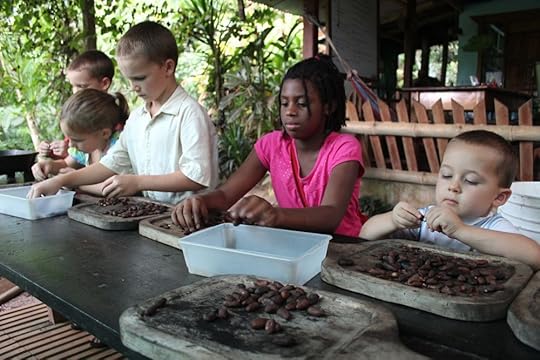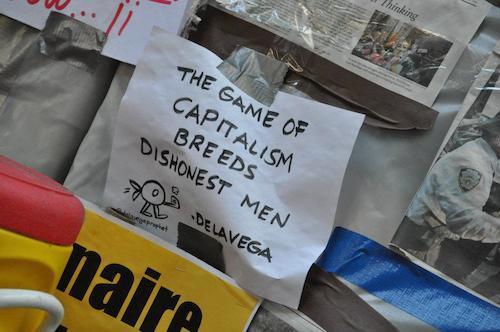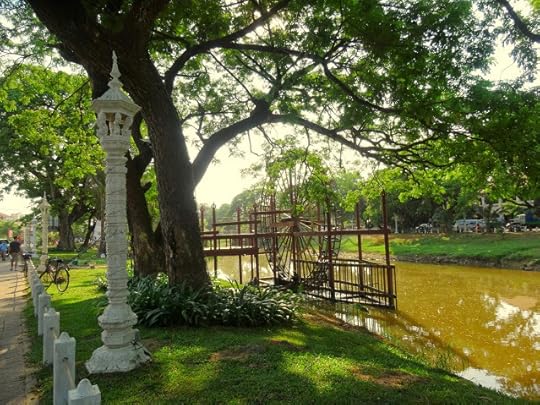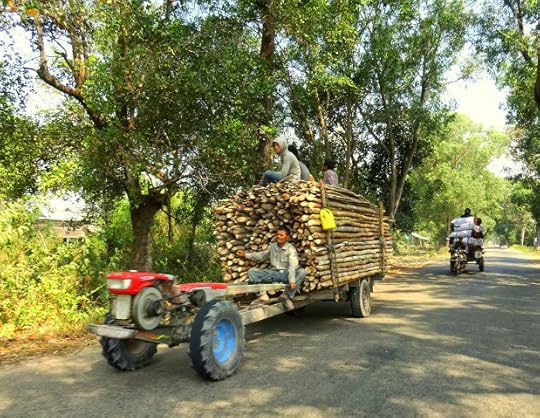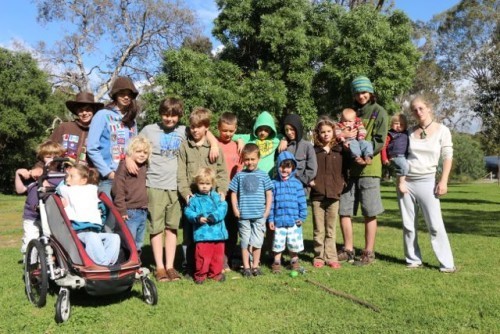Rolf Potts's Blog, page 31
August 12, 2014
Vagabonding Field Report: Organic Chocolate Farm in Costa Rica
Vagablogging :: Rolf Potts Vagabonding Blog

Cost/day: $20/person
What’s the strangest thing that’s happened lately?
Yes, I am nine months pregnant (today is my due date). But instead of sitting at home waiting around, we decided to visit an organic chocolate farm (and swam in a tropical river on the way. Okay, I just took pictures, I didn’t swim.)
We had to travel along the same bumpy, dirt road that we did to get to the beach just a few weeks ago, but only part way.

 Describe a typical day:
Describe a typical day:
We’re staying in the mountains of the Central Valley, with a gorgeous view of the ocean waaaay off in the distance. Grandma and grandpa have come to visit, in anticipation of the birth of our sixth child. We’re all a little antsy just waiting around, so we decided to have an adventure. Enter the trip to the chocolate farm, just an hour from our house.
What do you like about where you are? Dislike?
Like: This chocolate farm is run by a family who has been in business for decades. They have volunteers who come and live and work to help out during harvesting. Learning about the entire process of making chocolate from cocoa bean to indulgent treat is very fascinating.
Dislike: The cicadas are in town, and they are very loud. It’s hard to hear our guide as he gives the tour. Oh that, and the biting ants. Don’t stand in one place for too long.

Describe a challenge you faced:
My biggest challenge was simply trying to get around with this very large belly!
What new lesson did you learn?
How chocolate is made, and that hands-on learning (worlds-schooling as we like to call it) is one of the best ways to learn, and some of the best experiences you can have. Plus we’re creating memories.
Where next?
Staying put here for a while for sure… we’re having a baby!
I’ve recently written a post — The Mother’s Guide to Funding Family Travel, check it out here. You can also connect with me on Facebook, or join our Fantastic Family Fridays.
Original article can be found here: Vagabonding Field Report: Organic Chocolate Farm in Costa Rica
August 11, 2014
A budget guide to roadtripping Australia
Vagablogging :: Rolf Potts Vagabonding Blog
With 22,292 miles of coastline, 37,117 miles if you count that of the many outlying islands, Australia is a vast continent that provides the perfect mix of terrain for a road trip of epic proportions.
From the rugged shores of Victoria all the way to the hot and humid deserts of the Northern Territory, many travelers crave the open road experience only Australia can offer.
But what does it really cost to explore Australia overland, and what are the best travel hacks to use en route?
Transport and accommodation
There’s no getting around the fact that to road trip you need a vehicle, and if you plan to be on the road for more than a few weeks it makes sense to buy rather than rent.
If you plan to purchase your own set of wheels check out my handy guides to buying a campervan in Australia and selling it on once you’ve completed your trip.
Remember to consider your accommodation budget when looking for your vehicle. To keep your costs down consider how you can adapt your vehicle to accommodate yourself and your travel buddies. With a little imagination it’s easy to make some simple adjustments so you can sleep and eat on the open road.
Note – This might not be applicable if you’re renting a vehicle. You’ll not be able to alter the fabric of the vehicle in anyway so make sure you try out any potential sleeping positions before signing the rental contract!
If you’re time poor as well as on a tight budget take a look at these clever tricks for securing cheap rentals.
Relocation deals
Rental companies often dramatically discount certain routes in a bid to relocate vehicles that are needed at other centers or have been left with them as part of a one way rental. These deals are often a tiny fraction of the actual rental rate and more often than not the rental agency provide you with a budget for fuel.
If you can find these deals to help you hop about the country they are a great option for those who want to see the country but have limited funds to do so.
Note that time limits are placed on this kind of rental so this not a good option for anyone who wants to explore at their own pace.
Take a look at;
Apollo Camper – Relocation deals
Vroom Vroom Vroom – Relocation deals
Britz – Relocation deals
Pimp your ride
If you’re a solo traveler or travelling with just one other person, consider advertising for a few travel buddies to reduce your share of the total cost of your trip.
Websites like Gumtree, Trav Buddy and Travel Friend are a great place to start. You can also details of your trip, expected cost and your ideal travel buddy to online travel forums, Lonely Planet have a great forum here.
Stay for free
Accommodation can account for a fair chunk of your travel fund if you don’t actively seek low cost options. Even hostels can be costly in the most popular locations so don’t rely on them for a cheap room for the night.
If you’re happy to sleep out under the stars, or in your vehicle then a copy of the latest edition of the Camps Book is a worthwhile investment. Detailing a wealth of low cost – under $25 AUD/night – and free camping options across the country this guide is worth its weight in gold. It also doubles as a countrywide road map.
Websites like HelpX that detail accommodation/volunteer exchange opportunities can also offer road trippers a break from their daily budget constraints. Take a look at the opportunities listed along your route and consider an alternative to the tourist attractions along the way.
Looking for free accommodation without the volunteer price tag? Consider house sitting. An accommodation/caretaking exchange house sitters step into the shoes of the home owner during their stay. Sign up with the world’s biggest house sitting website Trusted House Sitters to apply for assignments.
Be a savvy saver
The cost of living in Australia is higher than that in other countries on the well-trodden backpacker trail so it pays to be considered each time you make a purchase.
Other than the cost of purchasing or renting your vehicle your other major expenses will be groceries, fuel and activities. Check out this collection of useful links for ways to save on the road.
Motor Mouth – A fuel price comparison website. Find the cost of fuel at all the gas stations close by. Also worth noting is their research which suggests that Tuesdays and Wednesdays are the cheapest days to top up on fuel.
Note – If you shop in any of the major supermarkets you’ll find a fuel discount docket at the bottom of your receipt. Watch out for holiday bonuses where savings can reach 75c / liter.
Oz Bargains – A forum for discounts and deals. You’ll find almost anything here, as long as it’s discounted or offered in a deal! Check here for pay as you go mobile sims, great for mobile internet on the road, activates and tickets, and accessories to kit out your camper.
Groupon – A daily deals website. Check here for activities, tickets and restaurant discounts.
Take advantage of free stuff
Seek out free WiFi in cafes and public spaces.
Fill your water bottles at public fountains, – these can be found in most Australia towns just avoid drinking from any that are labelled as ‘bore water’.
Eat local. Buy produce grown locally to reduce the cost of your weekly shop, and consider going meet free for a proportion of the week to limit your spending.
Choose free activities over those with a fee – check out Noosa’s longboard competition in Queensland or the Rip Curl Pro event at Bells Beach in Victoria – details here.
There’s an App for that
Don’t forget to search for relevant Aussie Apps to assist with your quest for a low cost road trip.
Australia on the Cheap and the Australian Road Trips App are a great place to start.
Original article can be found here: A budget guide to roadtripping Australia
August 10, 2014
A person who has not crossed an African border on foot has not really entered the country
Vagablogging :: Rolf Potts Vagabonding Blog
“A person who has not crossed an African border on foot has not really entered the country, for the airport in the capital is no more than a confidence trick; the distant border, what appears to be the edge, is the country’s central reality.”
–Paul Theroux, Dark Star Safari: Overland from Cairo to Capetown (2003)
(2003)
Original article can be found here: A person who has not crossed an African border on foot has not really entered the country
August 9, 2014
The Value of Time
Vagablogging :: Rolf Potts Vagabonding Blog
It’s an increasingly accepted as fact that, as a nation, we have allowed a work culture to develop where taking time off is seen a sign of disloyalty or lack of care, and where extended time off is more of a concept than a reality. It’s also a given that more and more data suggest that the costs of this approach in stress and lack of free time for rest, recreation and family is having a profoundly detrimental effect on our society.
Traveling in Europe always brings the difference between the US and European cultures with regard to work/life balance was illustrated in sharp relief for me. It’s one thing to hear how the Europeans put priority on the “life” side of the balance, and it is another to see it in action. As many know, the Europeans enjoy social benefits such as maternity as well as paternity leave, and up to six weeks of vacation time per year.

Enjoying life.
To see the very obvious benefits of that strategic choice for a shorter work year play out in the lives of everyday Europeans illustrates the point. Watching families strolling in the parks, laughing and chatting happily, on a weekday afternoon or visiting with friends over a drink in a café—enjoying the free time their generous benefits affords them—is to reinforce any stressed-out American’s suspicion that we are on the wrong side of the equation.
Of course, there are economic trade-offs along with such benefits. With less time focused on work and more time focused on free time, GDP is affected and taxes are high to support these benefits. Countries with a historically take-it-easy approach to life such as Italy and Spain had no trouble swapping time at work for time with friends, but how do these policies fare in the more traditionally industrious nations of the north? Does this bother many of them?
Not very much, it seems. “Everyone hates taxes of course,” a German told me, “but we willingly make the trade-off because it’s a good bargain. The time is more valuable.” Another said, “We made the conscious choice to arrange the society this way, with the emphasis on maternal and paternal leave and more vacation time. It has many positive benefits. We just do with a little less material things.”
In a surprising finding that bolsters the arguments of proponents for more European-syle work arrangements, a recent analysis from the Organization for Economic Cooperation and Development (link to the study is here) found that workplace productivity doesn’t necessarily increase with hours worked. Workers in Greece clock 2,034 hours a year versus 1,397 in Germany, for example, but the latter’s productivity is 70 percent higher. In other words, there’s not necessarily the direct correlation that our system is predicated on.
“You Americans kill yourselves with antiquated work policies,” says a French acquaintance. “You have two weeks of vacation, if you are very lucky. We are a very prosperous, industrialized economy with a national healthcare service too. We make it all work.”
I knew it begged an inevitable question, and my friend asked it. “So why can’t you?”
That statement and its inevitable question was put to me many times, in many places. It is a question I brought back to the US with me. It stayed in my mind as my flight arced across the Atlantic and over the North American continent, remaining as an important souvenir. The issue was never about lingering in cafés or visiting the Alps, but rather the stuff of a good life: choices, time and freedom to make of it what we will. Would you be happier and more productive if you had more of these? What will it take for us as a society to finally demand it?
Original article can be found here: The Value of Time
August 8, 2014
Food: A Delicious Reminder of Our Travels
Vagablogging :: Rolf Potts Vagabonding Blog

Columbian Arepas first tasted at The Vic-recreated in Long Beach, New York!
At the age of twelve, I visited my friend Jill’s house and tasted what I still believe to be the best barbecue sauce around. Her dad’s friend Steve brought it with him on a visit from Toronto, Canada and I have never found its equal. Today, Diana’s Sauce lives in my own cupboard and I order it by the case.
Before I ever ventured out of my post-code, my mom shared my grandfather’s travel advice. “Take out half the clothes and put in twice the money”, he said. I’ve since shared his wisdom countless times, but regardless of the truth to it, no one ever said I’d need to save room in my rucksack to hold food products I learned to love along the way. And no one at all told me that if I couldn’t bring them home through customs, I would scour the Internet as soon as I returned just to find that one specific item that tempted my taste buds in my travels. It’s true, I do.
Today there are heaps of culinary tours and cooking classes in travel are all the rage. Travelers will tell you that eating local and traditional cuisine is part of truly experiencing a country or city. Why stick to KFC or McDonalds when the world of Indian curries or Vietnamese pho is so easily in your grasp? I can’t say it’s all for me, I did give the fried tarantulas a miss in Cambodia and said no to the kudu steak in Namibia-but then again, I am a vegetarian.
Having tried treats around the world there are many that are worth keeping at home reminding us of our travels. There are others that can’t be found outside of their homeland, but they are to be savored and perhaps the memories are so strong that they draw you to book that ticket once again. And there are others dishes still that although not the same, we can try to recreate to have an Australian or Argentinian-themed dinner at home in New York.
Here’s some of what’s made its way into my cupboard since I first left home:
Tim Tams: Australia
Vegemite: Australia
Chocolate Teddy Bears: Australia
Mint Slices: Australia
BBQ Shapes: Australia
Uncle Toby’s Oatmeal: Australia
Branston Pickle: England
Licorice All Sorts: England
Quorn Chick’n Nuggets: Hong Kong/England
Ouma Rusks: South Africa
Brai Salt: South Africa
Nandos Hot Sauce: South Africa
Jungle Oatso Easy Oatmeal: South Africa
Simba Chips: South Africa
Mrs. Balls Chutney: South Africa
Chocolate Covered Coffee Beans: Costa Rica
Lizano Sauce: Costa Rica
Chickpea Flour: India
Whole Cumin Seeds: India
Masala Munch: India
Diana’s BBQ Sauce: Canada
What products do you bring home with you? What do you continue to crave after your travels?
Although they can’t possibly taste the same-these are just some of the flavours we’ve tried to recreate at home:
Colombian Arepas: Queen Victoria Night Market, Melbourne, Australia
Burgers with the lot: Australia/New Zealand
Kumara Chips: New Zealand
Watermelon Smoothies: Phuket, Thailand
Iced Lemon Tea: Hong Kong
Pho: Vietnam
Aloo Jeera (Potatoes with Cumin Seeds): India
Falafel: Israel
Empanadas: Argentina
Gallo Pinto: Costa Rica
Mahi Mahi: Bora Bora, French Polynesia
What recipes do you take home with you?
To read more about Stacey’s travels visit her website.
Original article can be found here: Food: A Delicious Reminder of Our Travels
August 7, 2014
Remaining flexible and happy travel accidents
Vagablogging :: Rolf Potts Vagabonding Blog

(Overheated near Barstow.)
Well folks – a small change in plans! I was going to do a different type of post this week and upload a video of some gorgeous canyons that I rode through in Arizona. Alas it isn’t to be. First, I’m can’t find an Internet connection with a decent upload rate. More importantly, I’m fixing poor Trinity (my beautiful companion — i.e. the Triumph above). That photo was taken near Barstow (or Baker – I don’t remember) and was the first time she’s ever overheated. It also wasn’t the last. Then, last night, I must have pissed off the biker gods, because this happened:
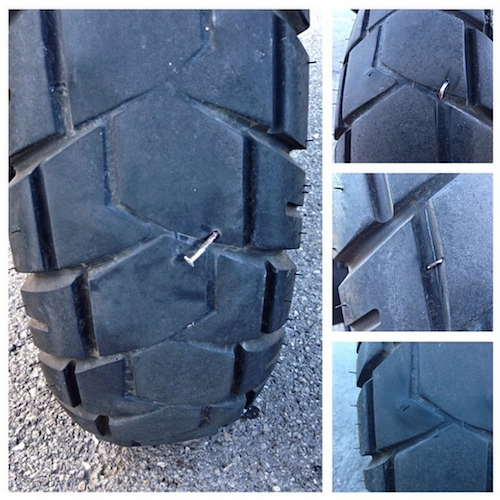
(My poor tire. Must have run over a hardware store.)
So – you can imagine that I’m pretty upset and pissed, right? Nope. If there’s one thing that travel has taught me, it’s to remain flexible and adapt to changing circumstances. I see travel and adventure as an inoculation against petty anxieties and fears. It just puts things into perspective. Sure, I have a troublesome bike and a flat tire – but I’m also traveling through some gorgeous roads in Utah. The scenery is amazing, the weather isn’t bad and there are lots of people and supplies around. Hell, I’ve broken down in Siberia with temperatures dipping below -35 degrees. I’ve broken down in the Gobi Desert after a flash rainstorm which turned everything to impassable mud. In comparison, this breakdown is pretty tame.
Then I was reminded about all the happy accidents which happen when things go awry. I was gathering supplies to tune-up Trinity and (hopefully) fix the overheating problem when I discovered the flat tire. I went back into the store for more supplies. When I came out, I noticed that a van had pulled up next to my bike. The driver introduced himself as Steve and wanted to check if I was okay. Caring people just make me feel good.
We began to swap stories and I learned that he was a retired school teacher and when he was younger had lived in the Ukraine and Latvia. What are the odds of running into someone who also enjoys the people of Eastern Europe and Russia? He also let me use his compressor and made sure I got to a nearby motel. Now I have another story to tell and a great experience.
This seems to happen over and over again. Things go off plan, we begin to improvise and happy accidents happen. I remember running getting lost, running late and thus meeting an incredible Polish family outside of Auschwitz. They gave us a a private tour of the surrounding town and invited us have dinner with them. The time we made a wrong turn in Siberia and had to turn back after half a day of battling impassible roads, only to run into a man and his son. Their snowmobile had broken down, so we gave them a lift back to the nearby village where they invited us in. That turned into one of my favorite nights on the Siberian trek. The time I crashed an ambulance into a huge drainage pipe in Mongolia. We met a wonderful man who invited us into his yurt for a traditional Mongolian meal and set us up for the night.
Some of my best memories began when things went wrong.
How about you? What are some of your stories? When was your last “happy accident”?
–
Chris Plough writes and podcasts at oznog.com, where he shares stories and advice from his adventures and from the incredible people that he’s met along the way. You can also follow him on twitter: @chrisplough.
Original article can be found here: Remaining flexible and happy travel accidents
August 6, 2014
Feeling guilt after some time away from “home”
Vagablogging :: Rolf Potts Vagabonding Blog
Malls have never really appealed to me. Growing up in upstate NY, there was a fair amount of time killed in these temples to consumerism. My friends and I would walk the halls, buy the pretzels, see the movies (lots of them), and window shop for clothes we didn’t need and couldn’t afford in an effort to detach from the boring reality of being a high schooler with no money, no rights, and no outlets for our energies. But, to me, malls have always a felt a little bit like places where ethics go to die.
We all knew the difference between “needs” and “wants” but that didn’t stop us from lusting after that new pair of sneakers. We had gasped in honest disgust when our economics teacher schooled us on just how our Gap t-shirts were made- but it didn’t stop us from begging for a new t-shirt every time we stopped by the mall with our parents. We spent our free time, which we had a lot of, painting our nails and dabbling in communist philosophy as we wrestled with the reality of economic disparity. Our parties came alive with debates on how to make the world a better place, questionable beverages fueling our fire and making us brave in our assertions about how things “should be”.
We were not ignorant to the world’s ills. Yet, somehow, when we stepped into the mall, none of it mattered. All that mattered was the want. Philosophy and practice were just so very hard to sync.
When my husband and I stepped back onto American soil a few months ago, we were so ready. Ready to feel at home. Ready to be fluent in the language. Ready to have more control over our food. Ready to see old friends. Ready for the familiar.
But there was a lot we weren’t ready for. We forgot to throw the toilet paper in the toilet. We forgot that we could use credit cards for $2 purchases. We forgot the constant rush of being a US citizen who “needs” to be someplace five minutes ago. We forgot about the fear of the foreigner. We forgot about the constant (questionable) “threat” of terrorism. But mostly, we forgot about the malls.
It sounds silly but one of the hardest things to get re-accustomed to when we re-entered the states was the malls. These places where people go to buy lots of things they didn’t know they needed when they walked in. Entire buildings devoted to encouraging us to spend money through subliminal messages, overt advertisements, and well-studied methods of presentation. Throngs of people. passing time, gathering things, and purposely pretending they don’t know that there is a single mother in Bangladesh, devastated and desperate, after her husband lost his life in a building collapse, making a t-shirt.
There is guilt for me, being back in the US. I don’t want it to be there, but it is. I know that the world is as it is and that there is good and bad everywhere. I know that all people, in Bangladesh, the US, and everywhere in between, are simply doing the best with the tools they have at hand. I know that guilt does not really do anything to change that which should not be. I know that I do not shop at those malls. I do not buy into consumerist culture. I do not philosophically support a system that does not value all human life. I know all of that. And yet… the guilt. Because, after all, whether I philosophically support it or not, am I not still benefitting from this system everyday?
I know the people in Guatemala who make those jeans. I have met the single mothers struggling in a basement in Varanasi to sew purses to ship to LA. I’ve played with the children in El Salvador who are dying, literally, to cross the border only to be greeted by picketers and protesters, bent on protecting their right to a lifestyle that I am not sure truly benefits anyone. I know these people. When I think about it, I think we all know these people in some way.
Philosophy and practice are still hard to sync. Only now, I’m not so sure I can ignore the gnawing feeling in my gut that things are too far out of balance for it to make sense anymore.
Travel feeds my soul and is what makes me feel like I am connecting in a full and meaningful way with the world around me. The only trouble with connecting in such a regular and meaningful way is that then those moments when there is disconnect can no longer be easily ignored.
Do you ever have unexpected guilt after traveling abroad? How do you attempt to sync up the philosophy and the daily practices?
Original article can be found here: Feeling guilt after some time away from “home”
August 5, 2014
Vagabonding Field Report: the two sides of Siem Reap, Cambodia
Vagablogging :: Rolf Potts Vagabonding Blog
Cost/day:
$40 per person if visiting Angkor Wat. $20 if not.
What’s the strangest thing you’ve seen lately?
The various temples of the massive Angkor Complex, the hordes of tourists that descend upon them, and the mass of children selling trinkets at each entrance and exit.
Describe a typical day: About half of our days were spent exploring the many temples of Angkor. On those days we would wake early to get out before the sun was too intense. We would spend the next several hours jockeying for position with other tourists in an attempt to get a picture or try for a near-impossible quiet moment of reflection. We usually headed back to the hotel around 2:00 where there was thankfully a pool so we could cool off. Afternoons and evenings were spent homeschooling and working until we’d head out to dinner, walking along the beautiful tree-lined river walk.
Describe an interesting conversation you had with a local: I talked to one local about the tuk-tuk profession in Siem Reap. According to him, Siem Reap is a bit of destination for people throughout Cambodia to come and try their hand at driving a tuk-tuk. Relatively, they can make good money by driving tourists around the Angkor Complex for the entire day or even over three or more days. Cambodians come from other cities or villages with the hope of doing well. Hearing this was not surprising considering the amount of drivers we saw there.
What do you like about where you are? Dislike?
There are two sides to Siem Reap for me: the insanity of the main buildings of the Angkor Complex and the town itself. Angkor was certainly worth seeing but really frustrating due to the amount of tourists. Leaving your hotel around 5:00 a.m. is the only way to get around this. Or you can visit the less popular buildings, which are generally not crowded and really peaceful. As for the city itself, I actually liked it quite a bit. I liked being able to find anything I could ever need or want in a small space at the market. The walk along the river is really peaceful and the restaurants were good and cheap. Locals were kind and helpful. Outside of the city and the main temple complex there were a lot of beautiful hikes and natural scenery. The only thing I disliked was that it was incredibly touristy, but it was expected.
Describe a challenge you faced: I don’t really want to call it challenge, but I was confronted with a well known scam in Siem Reap. This one involves a lady or child asking for assistance while holding a baby. She holds up a baby bottle and tells you she doesn’t want money, only milk for the baby. If you oblige and follow her to the store that is close by, she simply goes back later and returns the formula and gets the cash.
I’d been traveling long enough to know that something seemed off with the request so I declined. It was hard, though, to have a mother holding a baby pulling on your arm asking for help and then refusing. Even though I knew it was some sort of scam, which was later confirmed when I read about it online, it was still a haunting image. Despite it being a scam there was still a sadness to it all.
What new lesson did you learn?
I have a hard time enjoying anything if there are too many tourists, travelers, whatever you want to call them/us. Sometimes, though, if you want to see a place you just have to deal with it. I was able to actually enjoy some places in Angkor despite the huge amount of tourists surrounding me by accepting that it is just part of the deal. I can’t expect that a place so renowned is going to be free from tourists and disliking my time or hoping for something different is pointless. I had to accept that part of the Angkor experience is dealing with other people (a lot of other people). It was nice, though, to get to some of the less known spots in the complex where I could be alone and contemplate the grandeur and wonder of such an amazing place.
Where next?
Phnom Penh, Cambodia.
Original article can be found here: Vagabonding Field Report: the two sides of Siem Reap, Cambodia
August 4, 2014
Third culture kids
Vagablogging :: Rolf Potts Vagabonding Blog
People often ask us if there’s a social deficiency for our children, being raised on the road, weaving in and out of so many different cultures. It’s a serious question, and it deserves serious consideration.
My answer is always, “No, growing up in the world is the most socially healthy experience any child could have.”
They learn to adapt, respect differences, navigate generation gaps, live flexibly and develop language proficiencies that will make them infinitely more socially comfortable in our ever shrinking world than they would be if we spent our entire life in the little town we left. Nowhere was that more apparent than playing in the pool this week with the Korean delegation using the same techniques they’ve perfected for playing with kids when they are the ones who don’t speak the language.
There is not a social deficiency for our kids, or others that travel for a living, but that doesn’t mean there aren’t differences.
Our kids are what’s called Third Culture Kids:
“Someone who, as a child, has spent a significant period of time in one or more culture(s) other than his or her own, thus integrating elements of those cultures and their own birth culture, into a third culture.” According to my passport, I’m coming home, by Kay Branaman Eakin
These kids create a culture for themselves that’s a blend of their experiences, the upside is flexibility, adaptability, a high comfort level just about anywhere they’re dropped and the ability to roll with the punches like few people can.
The downside: they don’t entirely “fit” anywhere. My family traveled a little, just two winters of my childhood, and we straddled the international border between the US and Canada as a dual nationality family. Even that relatively small amount of cultural diversity I can relate to the third culture experience.
We love being “home,” in the USA and Canada, because so many of the people that matter most to us are here. Our children’s dearest friends are very “fixed-location” kids and they embrace one another as if not a day has passed and the cultural divide just doesn’t matter a bit to them, or to our kids, for that matter. But that doesn’t mean it’s not there.
We’ve witnessed this several times, with families in Germany & the Czech Republic, other traveling families in Central America and most recently when our virtual friends became real world friends. There is something that happens with Third Culture Kids meet other Third Culture Kids that is inexplicable unless you’ve seen it with your own eyes. There’s an understanding, a belonging, of sorts, between complete strangers that bonds them deeply, and it’s such a joy to watch.
This weekend our worlds collided. The very best of our chosen family joined us for an Independence Day camp out. We laughed, swam, told stories, and caught up after a long winter on opposite ends of the continent, and it was GREAT. And then, two of our favourite traveling families joined the party and added such an interesting dynamic. It t was such a joy to have them all in one place and to have, for just a few hours, both of our lives intersect in one place. There was a “wholeness” that we sometimes lack in the time spent with all of them.
Our kids miss people wherever we go. This is a common experience for Third Culture Kids. Not a day goes by abroad that they don’t wish aloud that their fixed-location friends were there to share an experience. When we’re “home” it’s the same, they wish for their abroad friends to share the day’s joy here. Jeremiah, one of Hannah’s best friends, is spending the week with us. Last night he made a comment that stuck with me: “I’ll bet you guys could fill this whole campground with the people you wish were here!” And he’s right, we could. The very best and very worst of travel as a lifestyle is that no matter where we are, we make dear friends, and no matter where we go, we miss someone we love!
Original article can be found here: Third culture kids
August 3, 2014
Airport hubs are trying to become our homes
Vagablogging :: Rolf Potts Vagabonding Blog
“These ‘non-places’ have radically changed the concept of home, not only for most of us in the first world but for a growing number of those in the developing world. Perhaps nothing has left so strong a mark on our identities as the periods spent in the sky and in the airports that gather together assorted strangers before sorting them on to different planes. An airport ‘hub’ is a stopping point between places. The ‘hub’ is an apt metaphor for how many of us among the privileged are living out the meaning of home in everyday practice. Those who are frequent flyers and spend much of the year moving between places might find that the place we call home has come to seem like the route to elsewhere. Home is where you do your laundry, run to the dentist to get your teeth cleaned, and frantically rest your weary bones before embarking on the next odyssey. In turn, airport hubs are trying to become our homes, offering outlets to recharge our numerous devices so we can continue to communicate from afar, as well as shopping, restaurants, prayer rooms, and massage.”
–Ruth Behar, “Searching for home,” Aeon, April 14, 2014
Original article can be found here: Airport hubs are trying to become our homes
Rolf Potts's Blog
- Rolf Potts's profile
- 323 followers


